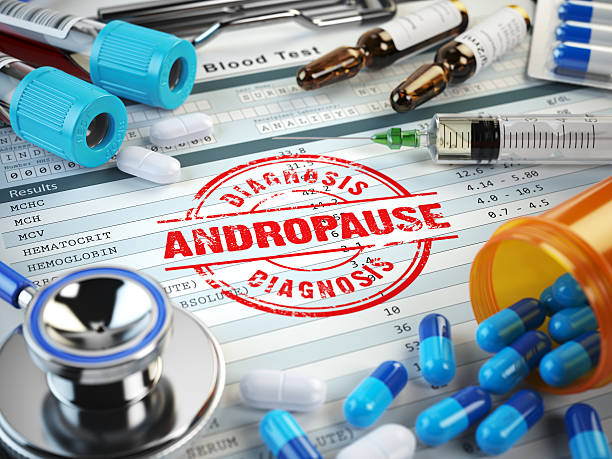Andropause is a word used to explain age-related variations in male hormone levels, specifically testosterone, it is often referred to as male menopause or late-onset hypogonadism. It is a slow, progressive drop in testosterone levels that most men experience as they get older, usually beginning in their late 40s or early 50s, though individual results may differ. Andropause, like menopause in women, is marked by a decrease in hormone production, which can cause a range of mental and physical changes.
Generally speaking, a man’s testosterone production starts to progressively decrease from the age of thirty and keeps going down from there. In contrast, some males see more pronounced impacts in their 40s or 50s. Low testosterone levels during andropause are caused by several reasons, including Aging: hormonal changes (characterized by modifications in the endocrine system), and Lifestyle variables (insufficient sleep, too much alcohol consumption, unhealthy diets). Obesity, Chronic medical conditions (diabetes, metabolic syndrome, and hypothyroidism), and certain medications (opioids and corticosteroids) can reduce the synthesis of testosterone.
MUST READ;5 Reasons Why You Need Health Apps
Individual differences exist in the symptoms of andropause, not all men will experience them altogether. However, the following are typical signs of andropause: decreased libido, erectile dysfunction, fatigue, mood changes, increased body fat, and decreased bone density among many other symptoms. It’s crucial to remember that while some men may have symptoms related to lowering testosterone levels, not all men will have andropause, and the degree of symptoms can differ greatly from person to person.
The goal of treatment for andropause or late-onset hypogonadism is to lessen the symptoms brought on by low testosterone levels. For an accurate diagnosis and customized treatment plan, those exhibiting symptoms must speak with a healthcare provider. Common treatments include; Testosterone replacement therapy (TRT), synthetic testosterone is given via TRT to bring hormone levels back within a more normal range. Lifestyle changes; this involves managing stress, getting enough sleep, maintaining a healthy, balanced diet, and engaging in regular exercise. Psychological help and counseling: It’s critical to address the emotional and psychological effects of andropause.
In Conclusion, Andropause is a normal aspect of aging, although each person may experience it differently in terms of impact and intensity. Before beginning any andropause treatment, people should speak with their healthcare practitioner to go over their symptoms, get the necessary testing done, and decide which course of action is best for them given their unique needs and circumstances.


